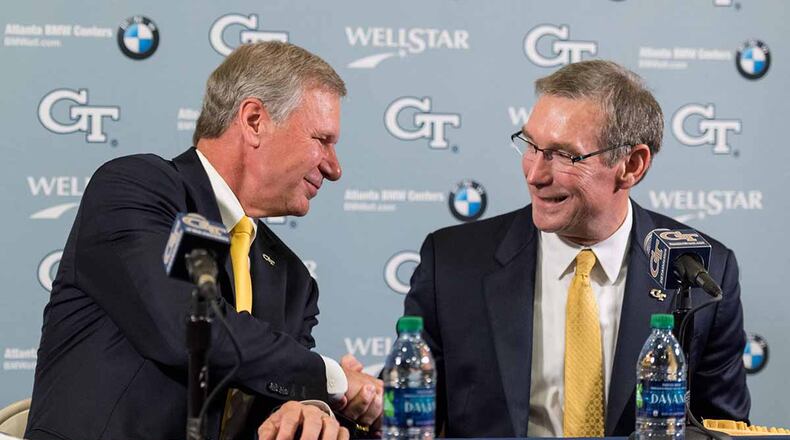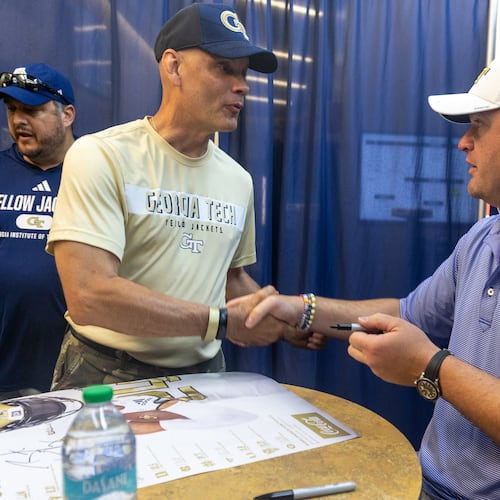Todd Stansbury’s spot on the College Football Playoff section committee is merited. The Georgia Tech athletic director, named Wednesday to be the ACC’s new representative to the 13-person group, has a long list of credentials that recommend him for the position to help select the College Football Playoff field.
“The opportunity to play college football and be close to the sport for the majority of my career has given me so much,” Stansbury said in a statement. “I hope to give back just a little by serving on this committee and helping choose the very best teams to compete for the ultimate prize each of the next three years.”
What awaits Stansbury in his three-year term on the committee?
A considerable demand on his time and energy, one that will require him to be ultra-efficient in his time management, likely delegate more of his Tech duties to his staff and probably limit his personal time during the fall.
Clemson athletic director Dan Radakovich, the former Tech AD whom Stansbury will succeed, estimated that he spent between 15 to 20 hours per week evaluating teams. That’s in addition to the weekly meetings convened for the final six to seven weeks of the season to assemble the committee’s Top 25 rankings.
“It kind of boiled down to, that was really my hobby,” said Radakovich, in an interview with the AJC in 2015 following his first of four seasons on the committee. “You work, and some people play golf, read books, whatever. During that period, from around the beginning of the season through December, that was kind of what the ‘leisure’ was spent doing, was being prepared.”
Preparing to rank the CFP’s Top 25 and then actually ranking them is a methodical process. Unlike most ballots in the AP and coaches’ Top 25, the CFP rankings are not static. A team that wins doesn’t necessarily keep its ranking, nor does a team that loses drop, as more information about each team becomes available.
For each member, that requires staying on top of teams likely to be ranked, assembling a personal top 25 and then preparing to explain and debate teams’ merits.
Committee members watch games, both on Saturdays and condensed replays prepared by the CFP staff. They pore over statistical breakdowns. (Stansbury will be pleased to know that SportSource Analytics, the data analytics platform used by the committee, was co-founded by a former Tech baseball player, Scott Prather.)
Members are assigned two conferences to know particularly well, provide a weekly report and be a point person on discussions on those leagues’ teams. While Stansbury likely would not be assigned the ACC, committee members might ask for his analysis on league members (he will be recused from conversations about Tech) that he may have seen in person.
“There were times you’d say, ‘Hey, did you see this team play?’ or ‘What did you think of that?’” Radakovich said. “Not as part of that report, but as part of general discussion.”
In an ESPN interview in January 2017, former U.S. Secretary of State Condoleezza Rice, a committee member for three years, said that members were "hyperprepared" and watched "multiple, multiple games." That evidently included Radakovich.
“Because you always wanted to make sure that if people asked you a question or the discussion was there, you wanted to be able to lend some type of good opinion and be prepared to talk about stuff,” Radakovich said.
Once the weekly rankings begin in late October or early November, committee members travel to the CFP headquarters just outside Dallas for meetings that run all day Monday and half of Tuesday.
“I was very, very lucky,” Radakovich said. “I’ve got a good staff of people who can keep things rolling at Clemson.”
The process to assemble the rankings has been described as intense but respectful.
“There was no one that stood up on a table and said, ‘Hey, that’s just wrong,’” Radakovich said. “There was really healthy, good discussion that kind of led us down the path to get to the ultimate goal, which is (to get) the last poll right.”
Radakovich was asked what advice he might give a committee aspirant.
“Like football,” he said. “You’d better like football. You’ve got to like watching it and dissecting it and making sure that you come forward with some really good ideas about how you’re going to present your views.”
About the Author
Keep Reading
The Latest
Featured



